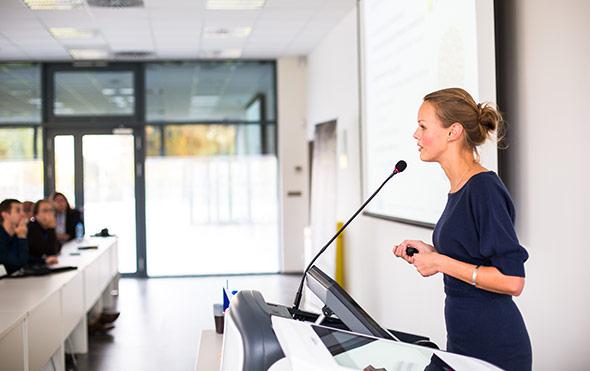This question originally appeared on Quora, the best answer to any question. Ask a question, get a great answer. Learn from experts and access insider knowledge. You can follow Quora on Twitter, Facebook, and Google Plus.
Answer by Robert Frost, engineer and instructor at NASA:
Here’s a little flowchart for how to handle questions during a presentation.
You’re asking for a crafty way to dodge a question, but that really is one of the stupidest things a person can do. Audiences can see right through it. They will lose confidence in your qualification to be speaking to them, and they will lose respect for you. Don’t do it.
As the presenter, you are in control of the presentation and responsible for ensuring the presentation gets completed as planned and that the audience gets what they needed. If the question is really getting outside of the objectives of the presentation, you should defer the question by saying you’ll talk to the individual after the presentation so as to not take up the time of the rest of the audience because you know they don’t need that answer.
But if the question is germane to the topic and of interest to the rest of the audience, the decision of what to do next comes down to whether you know the answer.
If you don’t know the answer, say, “I don’t know.” Immediately follow that with: “But I can find out for you.” Write down the question. At the end of the presentation, check back with the individual to ensure that the question you wrote down is what he or she wanted to know and that he or she still cares. (People often figure out by the end of the presentation that they really didn’t need to know the answer to the questions they asked.)
A presenter who tries to bullshit his audience deserves to die a blistering death. Don’t do it. No matter how good you think you are at BSing, the audience can tell. Be honest. Admitting you don’t know something can earn you big points with your audience. They will acquire more trust in you because they will have learned you are honest with them.
This is a hard lesson for people to learn. People hate saying “I don’t know.” They want to get around that in any way possible. They say things like “I’m not 100 percent sure.” No. You either know the answer or you don’t. If you aren’t sure, you risk providing negative training by giving them bad information that you will then have to work hard to get them to unlearn. In my old group, we used to have a foam ball we called the “BS ball.” We would throw that ball at people during their dry runs, when they began to BS.
In my environment, getting caught BSing can be devastating to your career. The astronauts are putting their lives and careers in our hands when we train them. They have to have 100 percent confidence that we can be trusted. Many years ago, I was teaching a crew member that was known for his sternness. He asked me a question that I didn’t know the answer to, so I immediately said, “I don’t know.” We continued, and he asked another question, and again I said, “I don’t know.” He stood up. For a brief moment I felt panic—that he was going to walk out of the room because he thought I was a moron who didn’t know my subject. To the contrary, he leaned over the table and offered his hand. He shook my hand, and he said, “Thank you. You don’t know how many people are unwilling to say that to me.”
It takes a lot of work to build trust, but it can be dissolved in moments. Don’t risk it.
More questions on Quora:
